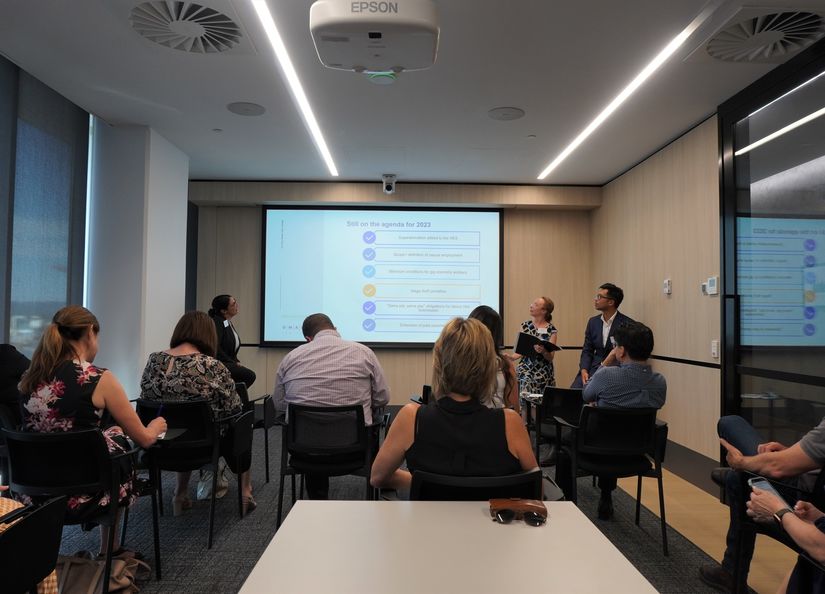What’s on the Horizon for Employers this Financial Year?
Through the first half of 2023, many businesses have grappled with the significant amendments to workplace laws that were introduced by the Federal Government in late 2022, including a ban on pay secrecy clauses in contracts, the automatic sunsetting of ‘zombie’ agreements and the more contentious changes concerning enterprise agreements.
As businesses enter the new financial year, workplace law and industrial relations have sharply returned to focus, with both the State and Federal Governments recently introducing (or foreshadowing) further legislative changes.
Further amendments made to Fair Work Act
Building upon the significant amendments made to the Fair Work Act 2009 (Cth) (FW Act) in December 2022, the Federal Government recently passed a bill (the Fair Work Legislation Amendment (Protecting Worker Entitlements) Act 2023 (Cth)) which gives effect to a second tranche of changes to the FW Act. Many of these changes were foreshadowed in the lead up to, and shortly following, the 2022 Federal election.
These further amendments are intended to further strengthen worker entitlements, address gender inequality and remove previous administrative burdens for employers and employees.
Some of the key changes are discussed below.
Parental leave
From 1 July 2023, parents and caregivers have greater flexibility when taking unpaid and paid parental leave. Many of the changes are intended to promote opportunities for shared parenting arrangements.
In particular:
- partnered couples can claim up to 20 weeks’ paid parental leave between them, with each partner taking at least 2 weeks (except in some circumstances);
- the former ‘Dad and Partner Pay’ entitlement under the Government paid parental leave scheme has been removed;
- the income test for the Government paid parental leave scheme has been changed to introduce a new family income limit of $350,000;
- employees may commence their period of unpaid parental leave at any time during the 24-month period after the birth or placement of their child;
- the concept of ‘concurrent leave’ has been removed and employees may take unpaid parental leave at the same time (previously couples could only take up to 8 weeks of unpaid parental leave at the same time);
- both parents can now take up to 12 months of unpaid parental leave (and request a further 12 months of leave) regardless of the amount of leave the other parent takes.
Employers who provide additional parental leave entitlements should consider how the amendments interact with existing parental leave policies.
Superannuation
From 1 January 2024, superannuation entitlements will be enshrined in the National Employment Standards (NES). There will be a requirement for employers to make superannuation contributions of such amount as is necessary to avoid liability to pay the superannuation guarantee charge under the Superannuation Guarantee Charge Act 1992 (Cth).
An employer who defaults in paying superannuation and contravenes the NES obligation could be subject to a civil penalty and other adverse court orders (as is the case for all contraventions of the NES). Additionally, rather than having to pursue a remedy through the Commissioner of Taxation, employees, unions and the Fair Work Ombudsman will be empowered to pursue unpaid superannuation directly from employers.
Deductions
From 30 December 2023, employees will be permitted to authorise their employer to make regular deductions from their pay of amounts that vary from time to time, provided that the deductions are not for the employer’s benefit.
This change is intended to ease the administrative burden caused by separate authorisations having to be made each time the amount of the deduction varies.
Migrant workers
From 1 July 2023, migrant workers (including temporary migrant workers) are expressly entitled to the protections under the FW Act, even where they may be in breach of their visa conditions or no longer entitled to remain in Australia.
The changes are intended to address concerns about exploitation of migrant workers. Going forward, even if a migrant worker has breached their visa conditions or no longer has work rights, they can still seek to recover unpaid wages or make claims under the FW Act, such as for unfair dismissal or adverse action. The changes also mean that to the extent of any inconsistency between a worker’s or visa conditions and the FW Act, the FW Act prevails. For example, a visa condition that an employee must be employed for a fixed term of three years would be of no effect when the two-year limitation on fixed term contracts comes into effect in December 2023.
Proposed criminalisation of industrial manslaughter in South Australia
The South Australian Government has recently announced that it will introduce the Work Health and Safety (Industrial Manslaughter) Amendment Bill (Industrial Manslaughter Bill) to South Australia’s Parliament.
The Industrial Manslaughter Bill follows years of consultation and discussion and builds upon an election commitment made by the Labor Government to criminalise industrial manslaughter in this State (as has already occurred in Queensland, Victoria, Western Australia and the Australian Capital Territory).
If passed, the Industrial Manslaughter Bill will impose a maximum penalty of 20 years imprisonment for individuals or $18 million for companies for reckless or grossly negligent conduct which breaches a work health and safety duty and results in a person’s death.
While the Industrial Manslaughter Bill does not impose any new health and safety duties on employers, the significant penalties are intended to serve as a significant deterrent against conduct which falls foul of the existing obligations.
Requesting employees to work on public holidays
As discussed in our article here, a recent decision of the Full Federal Court recently clarified that employers who wish to roster employees to work on public holidays must first ‘request’ employees to do so and what kind of request is required to be made.
The employer in that case has since sought permission from the High Court of Australia to appeal the Court’s decision.
It remains unclear at this stage whether the High Court will grant permission to hear the appeal, or how any appeal may be determined. We will provide further updates as this matter progresses.
Are further changes on the horizon?
It is noteworthy that the bill which amended the FW Act did not contain many of the significant (and arguably more contentious) changes that have previously been foreshadowed by the Federal Government.
Discussion and consultation between Government, unions and employer groups are underway in relation to further changes to be made to the FW Act, including in respect of:
- same job, same pay obligations for labour hire businesses;
- minimum conditions for gig workers;
- criminalisation of wage underpayments; and
- the definition of a ‘casual’ employee.
The timing of these changes remains unclear, however we expect to see draft legislation prior to Christmas 2023.
This article provides general comments only. It does not purport to be legal advice. Before acting on the basis of any material contained in this article, we recommend that you seek professional advice.
Co-Author
Name: Lachlan Chuong
Position: Associate
Practice: Disputes
Expertise
Our workplace team advises and represents clients in all areas of employment and industrial law, from day-to-day advice to support on specific issues.
We’ve helped our clients achieve their goals by structuring commercially effective workforce arrangements which protect intellectual property, confidential information, business contacts and goodwill. We also advise on disciplinary issues including misconduct, performance management, workplace grievances, bullying and discrimination, and have assisted with confidential legal investigations.
Find out more about how our expert workplace team can assist your business.
Related Insights
Employees must be asked whether they want to work on public holidays

Myth-busting: Workplace law

Pay secrecy clauses banned from 7 June 2023

Secure Jobs, Better Pay Act - how to prepare for the new workplace laws





